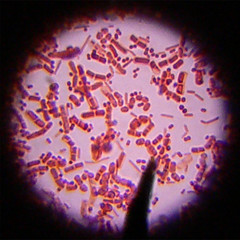There are trillions of microbiota living in the average human intestine. These microorganisms have formed a mutualistic relationship with humans and take on a number of functions including digestion, vitamin production, and the prevention of harmful bacteria growth. In addition to these essential roles, new research shows that four types of these organisms may prevent asthma.
The four types of bacteria are Faecalibacterium, Lachnospira, Veillonella, and Rothia. Currently, some scientists think that these bacteria, FLVR for short, help prevent asthma by creating chemical byproducts. These byproducts are thought to help train the immune system to attack harmful germs and to prevent inflamation. Having these microorganisms is essential for the development of children. It is possible that the absence of the bacteria can lead to many health problems for people, including asthma. Stuart Turvey, a pediatric immunologist at the University of British Columbia and a co-author of the study, thinks that being exposed to the FLVR microorganisms at very young ages is essential for preventing asthma and has said “Having the right bacteria in place at the right time is really important, especially in those early months of life.” Despite their research, scientists do not know much about why the immune system possibly malfunctions when it is not exposed to the bacteria. However they do know that the immune system becomes “confused” and creates inflammation in the lungs.
These new findings on asthma could possibly explain why asthma’s prevalence has tripled to quadrupled in first world countries in the past 30 years. The advanced medical knowledge and technology in these countries could possibly be creating an over sterilized world. Due to more and more doctors treating common sicknesses with antibiotics, human intestines are starting to become too clean and they lack the essential microorganisms including FLVR. The absence of of these FLVR bacteria is likely to put more people at risk of developing asthma. One study showed that many Canadian school children had very low levels of FLVR bacteria, putting them at high risk of developing asthma. Another study performed on mice strengthens the viewpoint that these bacteria prevent asthma. The study examined new born mice by exposing some to FLVR and leaving the rest without the bacteria. The results showed that the mice exposed to the FLVR at very young ages had much lower rates of inflammation in the airways.



sabraina
Wow, what an informative article. Fineflagellum, thank you for those statistics as well; it is interesting to see how new research about asthma is finally coming to light. According to, http://www.theverge.com/2015/9/30/9426145/asthma-prevention-gut-bacteria-protection-study, you could be just three months old lacking these 4 types of aforementioned bacteria and you’re already at a very high risk of developing asthma. Furthermore from my link, just as you mentioned the dependence on antibiotics is growing, it’s especially growing on babies! So scary!
fineflagellum
This was a very interesting article, thank you Zerillium. It has been interesting to observe the spike in the rate of asthma in the US over the past decade, it has risen over 12% (http://www.medscape.com/viewarticle/741989). This seems to be a very important finding since this cause has been overlooked in the past, as you can see here: http://www.unitypoint.org/livewell/article.aspx?id=e107bfb6-35ec-4421-9616-fc3ca391358f.